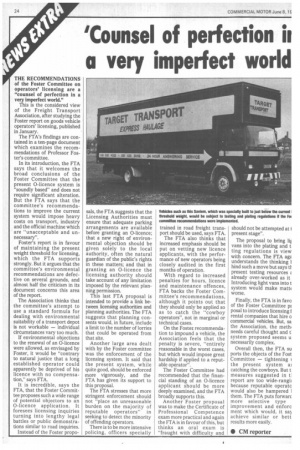'Counsel of perfection ii
Page 26

If you've noticed an error in this article please click here to report it so we can fix it.
a very imperfect world
THE RECOMMENDATIONS of the Foster Committee on operators' licensing are a "counsel of perfection in a very imperfect world."
This is the considered view of the Freight Transport Association, after studying the Foster report on goods vehicle operators' licensing, published in January.
The ETA's findings are contained in a ten-page document which examines the recommendations of Professor Foster's committee.
In its introduction, the FTA says that it welcomes the broad conclusions of the Foster Committee that the present 0-licence system is "soundly based" and does not require significant alteration. But the FTA says that the committee's recommendations to improve the current system would impose heavy costs on transport, industry and the official machine which are "unacceptable and unnecessary".
Foster's report is in favour of maintaining the present weight threshold for licensing, which the FTA supports strongly. But it argues that the committee's environmental recommendations are defective on several grounds, and almost half the criticism in its document concerns this area of the report.
The Association thinks that the committee's attempt to use a standard formula for dealing with environmental suitability of a transport depot is not workable — individual circumstances vary too much.
If environmental objections to the renewal of an 0-licence were allowed, as envisaged by Foster, it would be "contrary to natural justice that a long established operator could apparently be deprived of his licence with no compensation," says FTA.
It is incredible, says the FTA, that the Foster Committee proposes such a wide range of potential objectors to an 0-licence application. It foresees licensing inquiries turning into lengthy legal battles or public demonstrations similar to road inquiries.
Instead of the Foster propo sals, the FTA suggests that the Licensing Authorities must ensure that adequate parking arrangements are available before granting an 0-licence; that a new right of environmental objection should be given solely to the local authority, often the natural guardian of the public's rights in these matters; and that in granting an 0-licence the licensing authority should take account of any limitation imposed by the relevant planning permission.
This last FTA proposal is intended to provide a link between licensing authorities and planning authorities. The FTA suggests that planning consents would, in future, include a limit to the number of lorries that could be operated from that site.
Another large area dealt with by the Foster committee was the enforcement of the licensing system. It said that the present system, while quite good, should be enforced more vigorously, and the FTA has given its support to this proposal.
The FTA stresses that more stringent enforcement should not "place an unreasonable burden on the majority of reputable operators" in seeking to detect the minority of offending operators.
There is to be more intensive policing, officers specially trained in road freight transport should be used, says FTA.
The FTA also thinks that increased emphasis should be put on vetting new licence applicants, with the performance of new operators being closely audited in the first months of operation.
With regard to increased penalties for hours, licence and maintenance offences, FTA backs the Foster Committee's recommendations, although it points out that they should only be applied so as to catch the "cowboy operators", not in marginal or technical cases.
On the Foster recommendation to impound a vehicle, the Association feels that the penalty is severe, "entirely reasonable in the worst cases, but which would impose great hardship if applied to a reputable operator".
The Foster Committee had recommended that the financial standing of an 0-licence applicant should be more deeply examined, and the FTA broadly supports this.
Another Foster proposal was to make the Certificate of Professional Competence exam more practical and again the FTA is in favour of this, but thinks an oral exam is "fraught with difficulty and should not be attempted at I present stage".
The proposal to bring li vans into the plating and t ting regulations is view with concern. The FTA agg understands the thinking I hind such a move but says tt present testing resources k already over-worked as it Introducing light vans into t system would make matt( worse.
Finally, the FTA is in favo of the Foster Committee pi posal to introduce licensing rental companies that hire a commercial vehicles. But, sa the Association, the meth needs careful thought and t system proposed seems u necessarily complex.
Overall then, the FTA su ports the objects of the Fost Committee — tightening the present system ai catching the cowboys. But t measures suggested in t report are too wide-rangh because reputable operatc would also be hampered 1 them. The FTA puts forwarc more selective type improvement and enforc ment which would, it sa3 achieve similar or bett results more easily.
• CM reporter




















































































































































